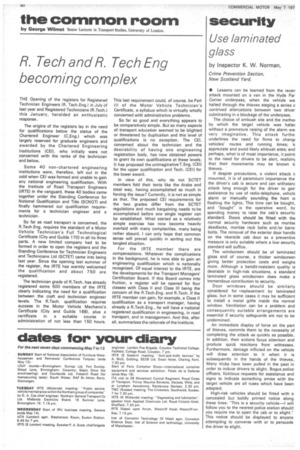the common room
Page 92

If you've noticed an error in this article please click here to report it so we can fix it.
by George Wilmot Senior Lecturer in Transport Studies, University of London.
R. Tech and R. Tech Eng becoming complex
THE Opening of the registers for Registered Technician Engineers (R. Tech.Eng,) in July of last year and Registered Technicians (R.Tech.) this January, heralded an enthusiastic response.
The origins of the registers lay in the need for qualifications below the status of the Chartered Engineer (C.Eng.) which was largely reserved for graduate engineers and awarded by the Chartered Engineering Institutions (CEO, who initially were not concerned with the ranks of the technician and below.
Some 40 non-chartered engineeeing institutions were, therefore, left out in the cold when CEI was formed and unable to gain any national engineering qualification. With the Institute of Road Transport Engineers (IRTE) in the vanguard, these 40 bodies came together under the Standing Conference for National Qualification and Title (SCNQT) and finally hammered out qualification requirements for a technician engineer and a technician.
So far as road transport is concerned, the R.Tech.Eng. requires the standard of a Motor Vehicle Technician's Full Technological Certificate (City and Guilds 170) in all its three parts. A new limited company had to be formed in order to open the registers and the Standing Conference for Technician Engineers and Technicians Ltd (SCTET) came into being last year. Since the opening last summer of the register, the IRTE has warmly welcomed the qualification and about 750 are registered.
The technician grade of R.Tech. has already registered some 500 members of the IRTE clearly indicating the need for a qualification between the craft and technician engineer levels. The R.Tech. qualification requires success in the Motor Vehicle Mechanic's Certificate (City and Guilds 168), plus a certificate in a suitable course in administration of not less than 150 hours. This last requirement could, of course, be Part III of the Motor Vehicle Technician's Certificate, a syllabus which is virtually wholly concerned with administrative problems.
So far so good and everything appears to be comparatively simple. But so many aspects of transport education seemed to be blighted or threatened by duplication and this level of qualifications is no exception. The CEI, concerned about the technician and the desirability of having one engineering registration body, has now obtained powers to grant its own qualifications at these levels. It has proposed the unimaginative T.Eng. (CEI) for the upper qualification and Tech. (CEI) for the lower award.
In view of this, why do not SCTET members fold their tents like the Arabs and steal way, having accomplished so much in forcing the issue? Currently, it is not as simple as that. The proposed CEI requirements for the two grades differ from the SCTET regulations and much bargaining needs to be accomplished before one single register can be established. What started as a relatively simple exercise has now become heavily overlaid with many complexities, many being rather absurd. I can only hope that common sense will prevail quickly in sorting out this tangled situation.
For the IRTE member there are compensations. Whatever the complications in the background, he is now able to gain an engineering qualification which is nationally recognized. Of equal interest to the IRTE, are the developments for the Transport Managers' Certification Board. If this Board comes into fruition, a register will be opened for four classes with Class II and Class III being the concern of the R.Tech.Eng. and R.Tech. If the IRTE member can gain, for example, a Class II qualification as a transport manager, having already a R.Tech.Eng., he will have a national registered qualification in engineering, in road transport, and in management. And this, after all, summarizes the rationale of the Institute.










































































































































































































